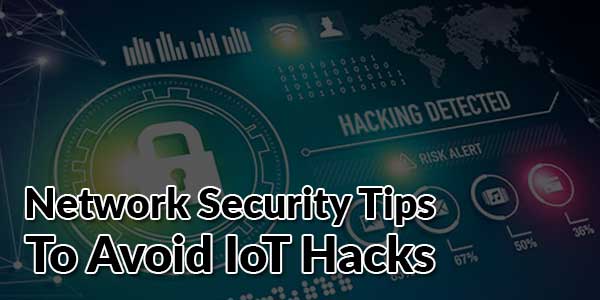
With the world becoming increasingly digitized and AI-powered solutions empowering homes, the need for network security has intensified. It’s a necessity for both home networks and businesses, as compromised networks can cause irreversible damage via cyberattacks.
The Internet of Things has created a whole other level of connectivity between connected devices, making homes, and businesses more efficient and smarter. However, when there’s a lack of security ingrained within our devices and network, it creates loopholes for cybercriminals to lay their traps and spread malware. The bottom line is that a smart home requires maximum protection to retain the safety of their homes and devices.
Whether it’s a home or a business network, safeguarding your system is critical to prevent exposing your network to attacks and experiencing significant losses. Fortunately, we’ve compiled some network security tips to secure data and counter IoT hacks.
Table of Contents
1.) Set And Update Passwords:
Keeping a strong password on any of your items or devices is necessary to maintain your privacy. Similarly, people should update the passwords of their Wi-Fi routers regularly as to not leave any entry points for hackers to exploit your vulnerabilities. Since most of our household items are connected to the internet, they will likely encounter hackers trying to steal viable information such as your location, pin codes, etc. Moreover, malicious viruses can cause technical problems to household items such as data loss, loss in functionality, and more. Therefore, to prevent such circumstances, you should renew your passwords once every month religiously.
2.) Create A Virtual Private Network (VPN):
A VPN grants full protection against threats that can harm your devices connected to the Internet. How does it do this? It makes your identity; thus, no hacker can track your device’s I.P. address to its exact location. Moreover, sharing essential information between devices becomes much safer as the VPN encrypts your data. Hence, hackers cannot gain access to personal information, ensuring the confidentiality and privacy of users.
A person can gain access to websites without exposing his identity. Thus, it’s a virtual shelter for all of your electronic devices that use the internet. In the case of IoT devices, creating a separate network prevents any entries for hackers or cybercriminals. Additionally, an identity and access management program can also be introduced to monitor and control the access of users. Users will be provided access points and can only use it according to the allowed privileges.

3.) Clean Out Unusable Apps:
People have the habit of harboring multiple apps on their smart devices that they never use. Such applications could have access to private information that can be compromised and create major privacy issues. Often, app developers don’t use the right security protocols during development, which leaves vulnerabilities in the code, making it easier for hackers to find cracks and cause havoc.
This is why users must go through their privacy policy to know what sort of information the app asks for and how it plans to use it. If your smartphone or any other device has apps that you’ve never used or no longer useful to you, then uninstall them. In doing so, you’re preventing your device, and others connected to the same network, from encountering any unauthorized access, malware, and cyber threats.
4.) Implement And Monitor Firewall:
A firewall is a hardware or software program designed to prevent any unwarranted access in their network system from unknown users. It’s responsible for controlling network traffic from authorized devices and blocking the ones that aren’t recognized by the system.
Besides, it gives you the power to observe all kinds of information that enters your computer network. It enables you to detect any hidden threats in the information which can corrupt your devices. Another valuable point is that it protects from Trojan horses. These nasty viruses transmit information privately to web servers when your device is connected to the internet.
IoT devices have become a magnet for cyber threats, which means they need to employ a close-to-impenetrable, multi-layered form of security that can defend their cloud network from a variety of internet-based attacks. It was predicted that in 2020 there would be approximately 25 billion IoT-connected devices employed by people. And with hackers becoming more tech-savvy as technology advances, the concerns for network security has drastically grown. Hence, implementing a holistic security approach that includes an all-around firewall and other security measures can help guard your home and enterprise.
5.) Update Your Firmware:
Updating the software in each of your household devices is a crucial step for improving security. Updating does not only mean improved functionality and fixing of bugs but also gaining a significant advantage of making your devices secured from unauthorized access. Security holes might have been present during the manufacturing of the software. Hence, they provide updates to fix them. IoT gadget manufacturers often notify users about software updates and maintenance fixes as a way to patch up any security flaws in the system.
Otherwise, these weak points can become a means of entry for vicious hackers. In addition, security updates handle flaws that exist in various software. If they are not, then hackers can use coding to find such kind of openings. Therefore, they can encrypt data stored on your devices and can quickly gain access to your personal information. Once they have control of confidential information, they can cause more damage than imaginable.
Wrapping Up:
Internet of Things won’t be going out of fashion any time soon; it’s the responsibility of users to take the vital steps to retain the security of their devices and networks. Leveraging the help of IoT devices has made life easier for individuals across the globe, but with great technology comes the need for great security. Businesses and smart homes must follow the network security habits mentioned above to safeguard their systems from IoT hacks and other malicious threats lurking the web.

 About the Author:
About the Author:












Be the first to write a comment.